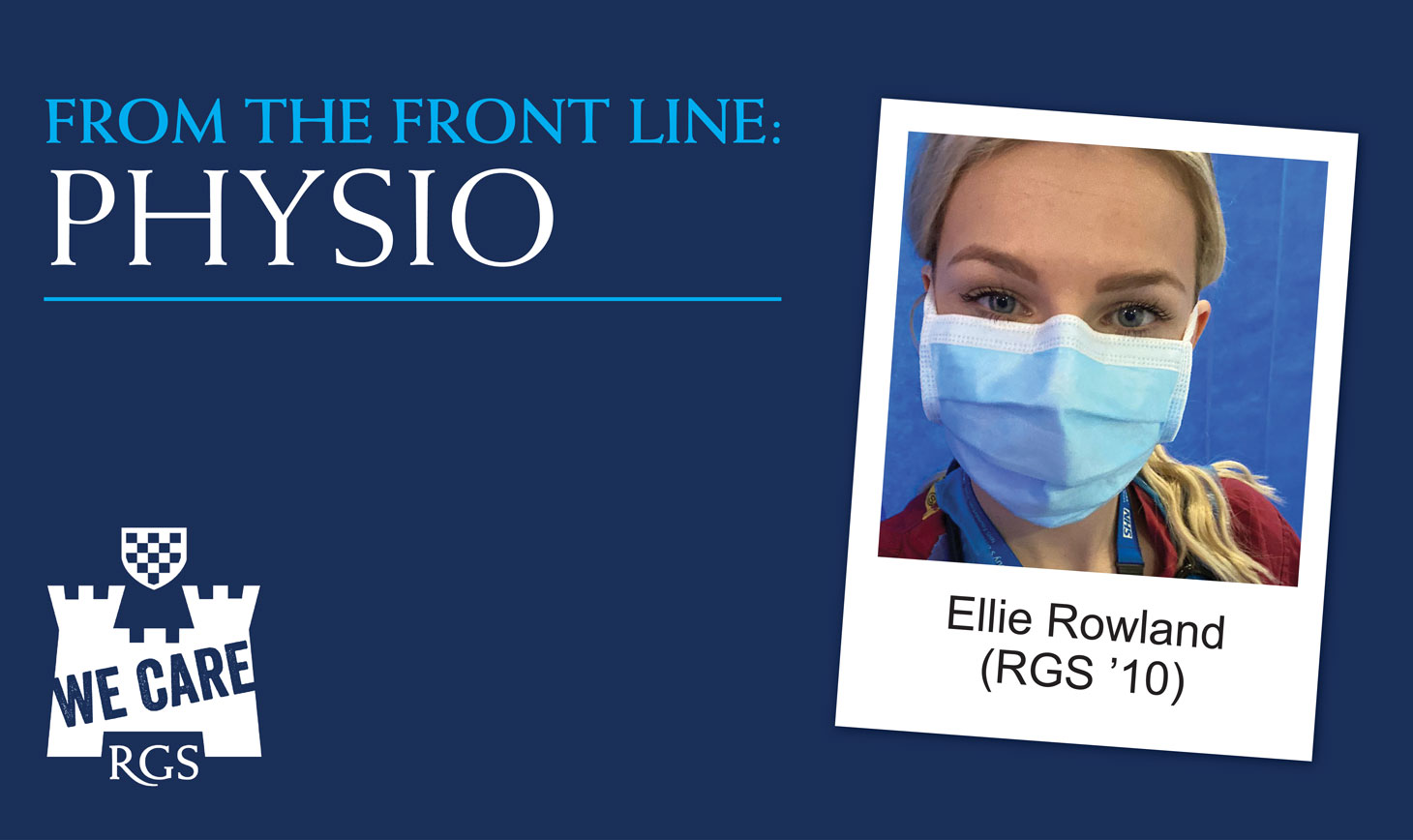
From the front line: physiotherapist
So many former students have awed us with their commitment, resolve and bravery on the front line of this pandemic. Ellie Rowland (RGS 2002-10) is one of these heroes, helping rehabilitate and re-orientate patients after weeks of being in ICU.
“Since this pandemic really kicked off in the UK, my work life as a Physiotherapist has changed substantially. Unfortunately, it has meant that I have not been able to see any of my private clients, however, I have been kept very busy through my day job as a Senior Physio within St Guys and St Thomas’ Trust.
Normally I’m working on A&E – but on 8 April 2020 I was redeployed from to the intensive care unit. More specifically, one of only five ICU’s in the UK containing ECMO machines. These machines are at patients’ bedsides and effectively act as their lungs where their own are not working properly – this gives the lungs a complete rest and time to heal. Only the most desperately ill patients arrive on these wards, often those with maximal independence prior to hospital admission. Typically, the patients are aged from their late 20s to 50s or 60s.
I had to refresh my knowledge on all the ventilator settings and physiotherapy involved. Covid-19 makes lung tissue less compliant, which leads to reduced oxygenation of the blood, so I had to have a refresher on the techniques used to help patients clear secretions off their chests and increase their lung volumes. There is no rehab in intensive care – all of the patients were heavily sedated/paralysed to prevent movements which could interfere with the ECMO machines. Patients were being turned onto their front to help increase lung volumes and reduce the amount of supplementary oxygen they required. As always, when treating these patients we would talk to them in case they could hear us and a team would use Skype so that their families could see them. This must have been so upsetting for patients families to see their loved ones in such a way and not be able to be by their bedside. On several occasions, these Skype calls were the last time family members saw their relatives alive. It was so difficult to witness and would often reduce us to tears.
It has been very emotionally challenging, very difficult not to bring it home with you. The teamwork on these wards was outstanding – consultants, nurses, physios, healthcare workers – all coming together to try and prolong, and improve the lives of these patients teetering on the edge. You would go home at night and hope that the patient you spent the day with was still clinging in there the next day.
At the end of April, when we had passed the peak and fewer beds were occupied in ICU wards, I was redeployed to work on the renal wards at Guys Hospital. Many of the patients who survive ICU can have complications and go into kidney failure requiring dialysis (around 30%). These patients had often been intubated and sedated for weeks. There were many emotional moments where patients became completely overwhelmed by what had happened to them. I won’t forget having to help patients re-orientate after six weeks of being unconscious in ICU… suddenly gossip magazines become a great source of joy! It must have been so hard for them not being able to have visitors – still delirious from ICU, coming around to the fact that they were seriously de-conditioned and had lost a lot of muscle and weight.
For those patients who were previously independent, it was sometimes a struggle to even sit on the edge of the bed without requiring support. Initially some had to toilet in bed using bedpans because they did not have the muscle power or exercise tolerance to be able to sit up without their oxygen requirements increasing drastically. A lot of physiotherapy in these early weeks involved helping patients to maintain a clear chest, preventing them from acquiring pneumonia, optimising independence with toileting and finding a safe method for patients to sit out in a bedside chair. An amazing team of physio’s and assistants have been heavily involved in rehabilitating these patients from being in bed, to walking again, providing therapy plans to help them build up their muscles, improve their balance and coordination, in addition to improving their exercise tolerance. It has led to many success stories where we have seen patients go from being seriously ill after leaving ICU, to going home excited to see their families.
I’ve had a really interesting journey through the Covid-19 storm; from admittance to A&E, through intensive care wards and now working rehab in the renal wards. We have a bit more time to process and reflect now as activity reduces. I hope that we can all get back to normal soon… not sure where I will be working next and whether I will be moved back to my rotation in A&E, but wherever I am I will take it day-by-day and try to work with a big smile – as I have seen all other healthcare workers doing.”
You might also be interested in…
See our amazing Reigatians in action – celebrating the dedication of Reigatians working on the front line
From the front line: GP surgery
From the front line: hospital ICU
From the front line: care homes
From the front line: medical graduate
